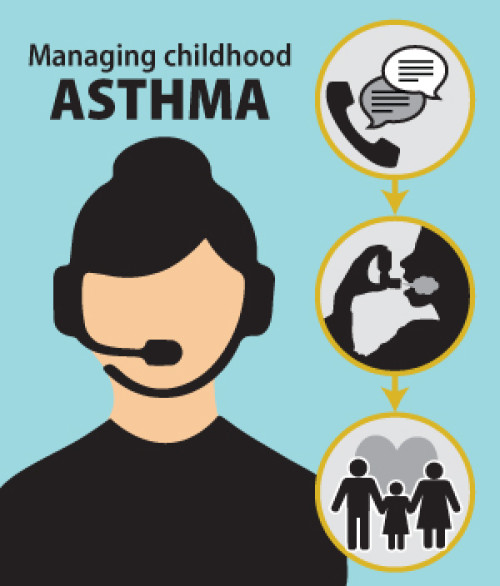
Managing childhood asthma is difficult. Rather than giving daily medications — even when children feel well — many parents treat asthma only when symptoms become severe. This practice can lead to missed school days, trips to the ER and hospitalizations.
But a novel program at Washington University School of Medicine in St. Louis suggests that peer trainers who coach parents over the phone on managing their children’s asthma can sharply reduce the number of days the kids experience symptoms. The program also dramatically decreased ER visits and hospitalizations among low-income children with Medicaid insurance.
“We tried a new approach for managing asthma, and it worked,” said the study’s first author Jane Garbutt, MD, a professor of medicine. “Peer trainers — moms of kids who had asthma — provided education and support to parents to enhance care provided by primary care physicians. This additional support helped parents to better manage their child’s asthma.”
The results of the study are available online in The Journal of Allergy and Clinical Immunology.
Asthma is the most common chronic disease among children. On average, one in 10 children in the United States has asthma. The condition is more common in urban, low-income areas. In the city of St. Louis, one in five children has asthma.
The annual cost of treating asthma in the United States is almost $18 billion, according to the Asthma and Allergy Foundation of America. Garbutt estimated that every dollar spent on this new program for children with Medicaid insurance could save $3 by preventing ER visits and hospitalizations.
Garbutt The two-year trial evaluated 948 families with children ages 3 to 12 years who had asthma. The families, recruited from 22 pediatric practices, were divided randomly into two groups. In one group, families received usual asthma care from their pediatricians. Families in the other group also received usual asthma care in addition to regular calls from peer trainers over a one-year time frame. On average, each family received 18 calls.
During a series of brief calls, the peer trainers taught parents new skills such as how to give medications effectively, encouraged parents to take their children to primary care physician appointments and provided support to help parents better manage their children’s asthma. Parents chose a topic for each conversation, which lasted 10 minutes on average.
After one year of telephone coaching, families in the peer training group reported on average that their children experienced an additional three weeks without asthma symptoms, compared with children in the other group. Children with Medicaid insurance showed a similar reduction in asthma symptoms and had 42 percent fewer ER visits and 62 percent fewer hospitalizations. These reductions lasted through a year of follow- up without any further contact with the peer trainers.
Garbutt said the researchers found out that most parents weren’t aware if their children were having asthma symptoms. The study motivated many parents to start a notebook of daily symptoms, talk to their children’s teachers and treat their children’s asthma daily, as opposed to waiting until symptoms were severe.
“Asthma can cause significant problems for children and their families,” said Robert Strunk, MD, professor of pediatrics and the paper’s senior author. “The peer-training approach makes so much sense because it can help parents overcome barriers that prevent effective use of medications and other issues that interfere with asthma care. Seeing the outcomes of Dr. Garbutt’s study has been gratifying, and I hope that her peer training model can be applied broadly.
Garbutt’s goal is to see this model adopted by hospitals or insurance companies. “This is an exciting new approach to chronic disease management, and we would like for it to reach many families,” she said. “If implemented on a large scale, I think a program like this can help children with asthma live full, healthy lives.”
Story Source:
The above story is based on materials provided by Washington University in St. Louis. The original article was written by Diane Duke Williams. Note: Materials may be edited for content and length.
Journal Reference:
- Jane M. Garbutt, Yan Yan, Gabrielle Highstein, Robert C. Strunk. A cluster-randomized trial shows telephone peer coaching for parents reduces children’s asthma morbidity. Journal of Allergy and Clinical Immunology, 2014; DOI: 10.1016/j.jaci.2014.09.033
